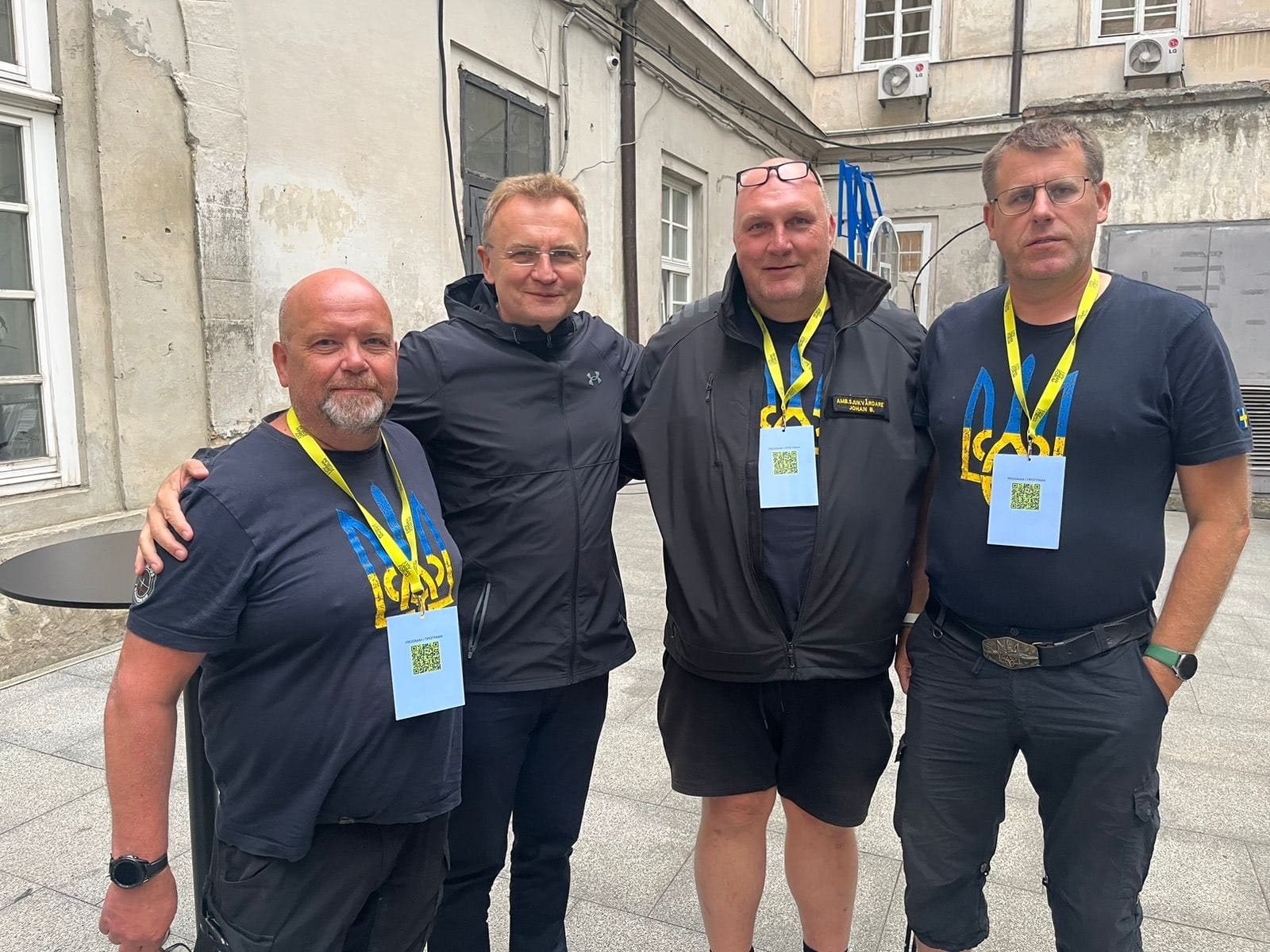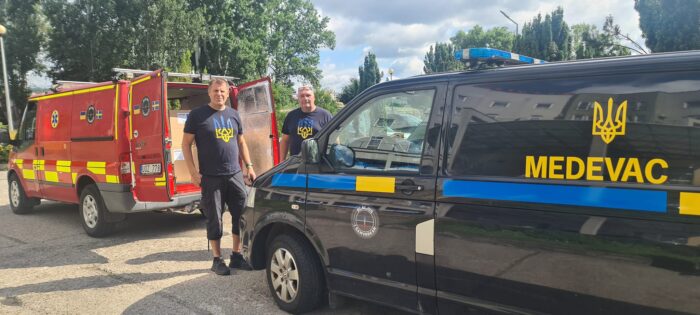“Freedom is the most important thing for human beings, it is something we all have in common.”
Interview with Pär Johansson, president of the Swedish charity Blåljus i Samverkan. Interviewer: Nikodem Szczygłowski.
August 28, 2023 -
Nikodem Szczygłowski
Pär Johansson
-
Interviews

Representatives of Blåljus i Samverkan together with Andriy Sadovyi, the mayor of Lviv. Photo: Pär Johansson
I recently returned from Lviv, where, together with volunteers from the Swedish NGO Blåljus i Samverkan, we jointly delivered aid to Ukraine – two equipped rescue ambulances and a large batch of special water filters that enable dirty water to be converted into drinkable water under field conditions. The aid was delivered to post-flood Kherson.
Earlier, on April 22nd, a Blood Centre bus – a mobile laboratory that allows doctors to be closer to people who intend to donate blood, as well as those who need it – was handed over to the Lviv region. This unique bus – the only one in Ukraine at the moment – was also donated by a Swedish foundation and the Blood Centre in Stockholm.
The Blåljus i Samverkan foundation was founded by three people – a firefighter, a police officer and a paramedic – to bring help and support to people working in these fields and their families. Since the start of the Russian full-scale invasion of Ukraine, the Swedish foundation has decided to direct its resources towards helping the country, which is also where its focus remains.
Representatives of the foundation are contacting various services in Sweden with proposals to help Ukraine with essential supplies and are also soliciting donations from anyone who wants to help.
As of March 2022, the Swedes have already organised, brought and donated more than 25 vehicles, mainly ambulances, fire engines, rescue vehicles and other equipment that helps save people’s lives, to Ukraine with their own efforts.
“We believe that Ukraine is our neighbour, so when Putin attacked it, we had no choice but to do what we do,” said Pär Johansson, president of the foundation.
I met Pär last year in the first days of March in Przemyśl, when he first came from Sweden and was looking for people to help him and his foundation with contacts in Ukraine to deliver medical aid and four fully equipped ambulances. They arrived at the Polish-Ukrainian border with these during the flare-up of the refugee crisis.
This was followed by many more trips abroad together, conversations and reflections on what more can be done at the societal level, as people even in faraway Sweden understand the significance of the Russian threat to the world.
“We have the same national colours as Ukraine for a reason,” smiles Pär, answering my questions, “we are united by history.” He also told me that “we still have the same enemy,” as we prepared for a new mission to help the flooded areas of the Kherson region.

Vehicles delivered by Blåljus i Samverkan. Photo: Pär Johansson
NIKODEM SZCZYGŁOWSKI: You and your team have been helping Ukraine for over a year now, delivering equipped ambulances, fire engines, rescue vehicles and more. You have already delivered more than 25 such vehicles from Sweden to Ukraine. Why are you doing this? What motivated you to do this?
PÄR JOHANSSON: The main reason is Putin’s aggression against Ukraine, which is a threat to the whole of Europe. For me, it is also an opportunity to take part in the fight for freedom. Freedom is the most important thing for all people, it is something that unites us all.
Tell us more about your team. Who are the volunteers who travel from Sweden to the Ukrainian border and Lviv? For example, Mikke Sid Andersson, who was with you in Lviv last time, is a well-known musician who has worked with Abba and Roxette, among others. What is his role?
Almost all of our volunteers in Sweden work or have worked in the police, fire brigade or emergency medical services, as well as other emergency services. None of them are paid for the work they do for Blåljus i Samverkan during their mission in Ukraine. Micke Sid contacted me in 2019 before their last tour with Jillian Tider, inviting my colleagues to their concerts. All his relatives are connected to the Blue Light family (the name of the foundation directly refers to the blue lights of emergency vehicles), so we asked him to join the Blåljus i Samverkan board and become our ambassador. He helps us a lot to promote our activities, to explain to the Swedish people what we do and why we do it – and this directly affects the amount of help we can organise and the level of trust in us.
How did Blåljus i Samverkan come about? Initially, the aim was to help Swedish medics, firefighters and police officers. Why do you think they needed help and what were your initial goals? How has the war in Ukraine changed them?
Since the beginning of 2018, Blåljus i Samverkan has raised five million Swedish krona, which has been donated to various causes and used in different ways. Our main aim was to show solidarity and support for the bereaved relatives of uniformed service members, who have been injured or even lost their lives while performing their duties for our society, and to bring them economic assistance so that they can cope with the tragedy of losing their loved ones or being unable to work and not worry about money. The same applies to those who have been injured in the line of duty. Our foundation has also been launched to help the Swedish public better understand the context of the sometimes very difficult work that we do for our fellow citizens. When Putin attacked Ukraine in February last year, we immediately realised that we had to act, that the Ukrainians needed our help and that our past experience could be extremely useful in this.
A year ago, in March, we met for the first time in Przemyśl. Do you remember your first impressions of this border town, which at the time was home to more than 30,000 refugees and hundreds of thousands trying to get further into Poland and the West through Przemyśl? What were your feelings when you first saw the pedestrian crossing at the border in Medyka?
It was an extremely surreal feeling. The sight of refugees crossing the border was very unreal but at the same time it was fantastic to see all the volunteers looking after them on the Polish side. It also gave me the strength to continue our work for Ukraine.
Your team has visited Lviv once again. What are your impressions of this city, where people are trying to lead a normal life away from the front line, despite problems with electricity supply in winter and the constant shelling of critical infrastructure by the Russians?
Lviv is an incredibly beautiful city and, despite the military checkpoints, special security measures, occasional Russian air strikes and shelling, special measures taken to protect architectural and art monuments, and the electricity generators in front of shops and cafes that we saw in winter and spring on the city streets, it felt like any other city in Europe. Life was in full swing. It was a unique feeling.
Please tell us about how the whole process works – how do you find the vehicles, how do you deliver them, where do they then end up in Ukraine?
First, we raise the funds needed for the purchase through social media and our other contacts. Then we try to find suitable vehicles to buy according to the requests we receive through our contact in Lviv, our friend Roman. The requests come from the army, police, emergency services and fire brigade. So, when we start our missions, we always already know the end user. Then it’s just a matter of logistics – we put together a close-knit team of volunteer drivers, coordinate logistics, collect all the necessary documentation for customs declarations, buy ferry tickets to Poland and set off. Typically, we cross the Baltic Sea by ferry to Gdynia or Gdańsk, and then drive across Poland to Przemyśl and on to Lviv, where we hand over our convoy into safe hands – and then the vehicles and the aid we have collected reach the recipients through the efforts of local Ukrainian volunteers.
Do you think this war, which is remote from a Swedish point of view, has changed Swedish society?
Yes, from a nation with a largely dismantled defence system and a general belief in peace and the immortality of humanity, we are now in a completely different situation, with the real threat of a nearby war hanging over us. Russia clearly threatens us again. We are all aware of this.
Why do you feel it is worthwhile to continue what you are doing? What gives you the most satisfaction in your work?
As long as Putin is alive, we will continue our humble work for peace and freedom. The happiness and gratitude of the people in Ukraine, who receive our help and know that the equipment we donate works and is a real help in their struggle, gives meaning to our efforts and is our small contribution to the great cause of victory over evil.
Pär Johansson is the president of the Swedish charity Blåljus i Samverkan.
Nikodem Szczygłowski is a writer, essayist, translator and traveller. He is fluent in English, Lithuanian, Slovenian, Ukrainian and others. He is a recipient of the award for achievements in journalism from the ministry of culture of the Republic of Lithuania and a graduate of Mediterranean Archaeology at the University of Łódź. He also has an MBA from the Central European Management Institute in Prague.
Please support New Eastern Europe's crowdfunding campaign. Donate by clicking on the button below.

































